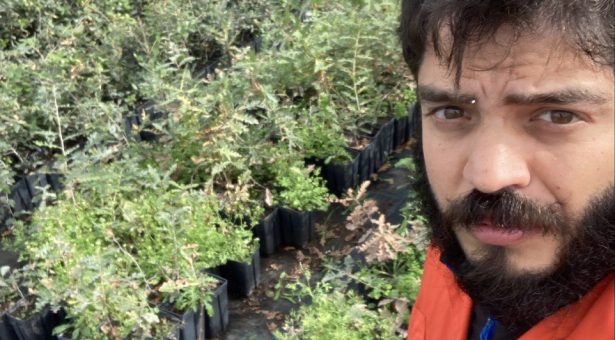Giuseppe widens his horizons with a placement with ARSIAL

Giuseppe wanted to undertake an internship that would provide him with an insight into research with impact and application, specifically related to climate change. He wanted to also explore potential employers in Italy. He identified his PIPS opportunity through a former colleague in Italy who now co-ordinates a LIFE research project on forest decline (17NAT/GR/000511 LIFE PRIMED). Giuseppe’s contact identified the possibility of working with one of project partners Agenzia Regionale per Lo Sviluppo e L’Innovazione dell’Agricoltura del Lazio (ARSIAL), a public research organisation for improving agriculture and forestry in Italy.
The project was divided into bibliographical research activity and practical field work. During the first month Giuseppe researched and wrote protocols for seed propagation of native Mediterranean plants. The first stage of the placement also included networking trips to different nurseries and a second research facility to interview experts and managers to help identify best practice. The internship was very practically focused, working with the ARSIAL forest plantation/nursery team to help regenerate areas of the “Palo Laziale” oak forest (LIFE PRIMED project site). The placement involved the collection of acorns (best specimens) from five different oak species. Several weeks were initially spent developing a best planting technique with the aim of sowing 20,000 acorns in a large nursery adjacent to the forest. Giuseppe introduced a more rapid process for planting using estimated weights of acorns and developed a spreadsheet to track sowing data. Giuseppe also undertook parallel projects including working with marshland tree species with a partner nursery and helping his line-manager establish a ‘certified’ nursery for oak. He learnt a lot about quality assurance and legislative frameworks to enable tracking of oak wood to source material.
Giuseppe felt he gained many benefits from the internship, including an increase in his self-confidence and in his knowledge. “I have more knowledge, and not only on the theoretical aspects that I had to study during the first month. Through the practical work at the nursery, I acquired useful horticultural skills”. Apart from learning new physical techniques and knowledge of arboriculture, Giuseppe’s main learning points were how to be resilient and adaptable when working with field-based research that is subject to environmental conditions. He also gained insight into differences in the research environment in Italy compared to UK.
Giuseppe learned the importance of networking to support research progress. Finding and setting up the placement as well as planning the logistics of the placement also helped improve Giuseppe’s organisational skills. The placement also taught him a great deal about teamwork; “I understood how teamwork is the central most important skill that a good scientist needs to develop. When it comes to fieldwork, everyone relies on the work of the team. I had many occasions where I couldn’t work at the nursery because I had to collect samples, but I could always count on the staff for this. It is very important to have a team you can rely on”.
Giuseppe felt the placement widened his horizons in terms of his career path. “From a professional point of view, these 3 months helped me grow, more than any other similar experiences had done in the past”. He advises future PIPS students to choose a placement that brings them out of their comfort zone. “Experiment with something where you’ll need to acquire new skills and improve the ones you have. I’d also suggest trying to do it in another country, with the purpose to understand how research and job works abroad and compare to the situation in the UK”, says Giuseppe.
